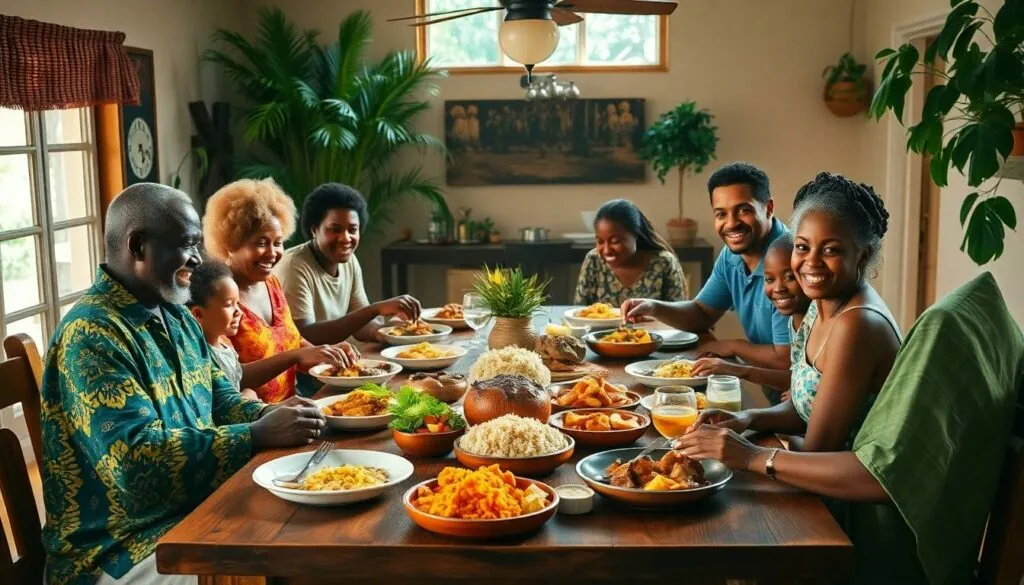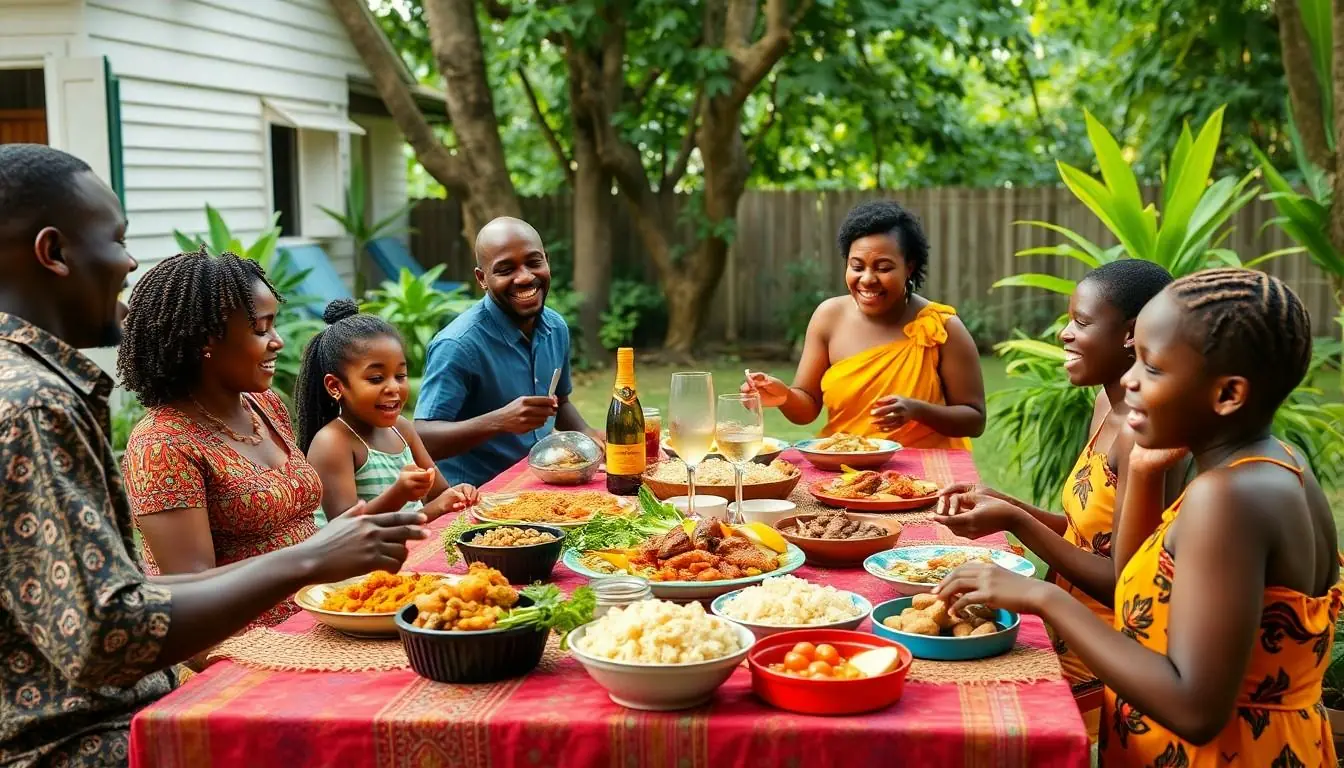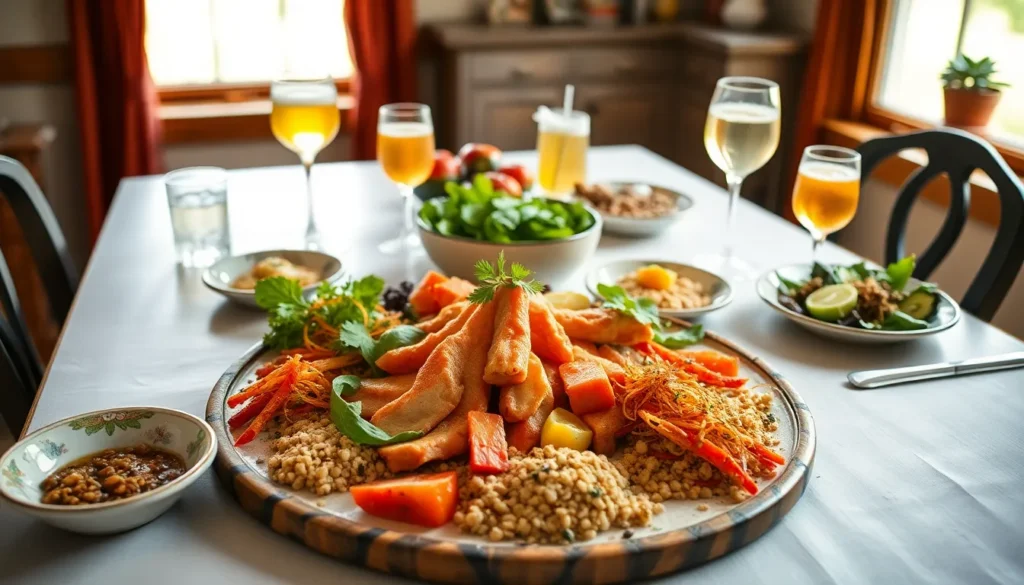Table of Contents
ToggleJamaican family traditions paint a vibrant tapestry of love warmth and unbreakable bonds that have been cherished for generations. From the moment the sun rises over the Caribbean Sea families across the island embrace customs that blend African heritage British colonial influences and unique island culture.
These time-honored traditions go far beyond the stereotypical images of reggae music and jerk chicken. They’re deeply rooted in respect for elders storytelling through patois and the gathering of extended family for Sunday dinners where aromatic curry goat and rice and peas fill the air. Whether it’s the celebration of nine nights after a loved one’s passing or the joyous Christmas Grand Market festivities these customs continue to shape the identity of Jamaican families both on the island and across the globe.
The Importance of Family in Jamaican Culture
Family bonds form the cornerstone of Jamaican society, serving as the primary source of emotional support, cultural transmission, and social stability.
Extended Family Structure
Jamaican families embrace a communal living system that extends beyond the nuclear family unit. Grandparents, aunts, uncles, cousins and godparents actively participate in child-rearing responsibilities. Multi-generational households remain common, with 65% of Jamaican families including extended family members under one roof. Family compounds, where relatives build separate houses on shared land, create tight-knit communities that foster resource sharing and mutual support. This structure enables families to pool financial resources, share childcare duties and maintain strong kinship ties through daily interactions.
Respect for Elders
Elders hold revered positions in Jamaican families as guardians of wisdom and tradition. Children address older relatives using formal titles like “Aunt,” “Uncle” or “Miss/Mr.” followed by their first names. Family gatherings center around elder family members who share oral histories, proverbs and life lessons with younger generations. The practice of “sitting at the feet” of elders during storytelling sessions continues as a cultural norm. Grandparents often take leadership roles in family decision-making, from settling disputes to arranging marriages. This hierarchical respect system ensures the preservation of cultural knowledge and maintains social order within families.
Traditional Jamaican Family Gatherings
Jamaican family gatherings embody the vibrant spirit of communal celebration with food music dance at their core. These social occasions strengthen family bonds through shared experiences traditions passed down through generations.
Sunday Dinners
Sunday dinners in Jamaican households serve as weekly reunions where extended families gather to share traditional meals. The dining table features signature dishes like curry goat rice peas oxtail brown stew chicken ackee saltfish. Family members arrive early to help with meal preparation creating opportunities for storytelling knowledge sharing between generations. Children learn cooking techniques family recipes while elders share wisdom life experiences. These weekly gatherings often extend into evening hours with dominoes card games providing entertainment after the meal.
Holiday Celebrations
| Holiday | Traditional Foods |
|---|---|
| Christmas | Sorrel Fruit Cake Ham Gungo Peas Rice |
| Easter | Bun Cheese Fish Escovitch |
| Independence | Jerk Chicken Festival Bammy |
Food and Cooking Traditions
Jamaican families center their culinary traditions around vibrant flavors seasonal ingredients local spices. These traditions form the foundation of cultural identity preservation through generations of shared cooking experiences.
Passing Down Family Recipes
Jamaican family recipes transfer from generation to generation through hands-on kitchen demonstrations oral instructions. Grandmothers teach specific techniques for preparing dishes like ackee and saltfish jerk chicken rice and peas to their children grandchildren. Each family maintains unique recipe variations reflecting their ancestral heritage regional influences personal preferences. Recipe journals cookbooks filled with handwritten notes measurements modifications document these culinary legacies. Many families incorporate distinct spice blends secret ingredients passed down exclusively within their lineage.
Communal Meal Preparation
Traditional Jamaican cooking involves multiple family members working together in synchronized coordination. Mothers aunts sisters gather early to prepare Sunday dinners special occasions handling different aspects of meal preparation. Children participate by cleaning vegetables grinding spices learning proper seasoning techniques. The kitchen becomes a hub of activity where family members share stories exchange cooking tips master traditional methods. Elders oversee the cooking process ensuring proper techniques authentic flavors remain consistent across generations. Family members rotate responsibilities from chopping ingredients to monitoring cooking temperatures maintaining communal engagement throughout meal preparation.
| Traditional Cooking Roles | Common Tasks |
|---|---|
| Elders | Recipe oversight spice mixing |
| Adults | Main dish preparation meat seasoning |
| Young Adults | Vegetable preparation sauce making |
| Children | Ingredient cleaning basic prep work |
Cultural Values and Beliefs
Jamaican family values reflect a rich tapestry of African heritage mixed with colonial influences, creating distinct cultural practices that emphasize respect, spirituality and community connections.
Religious Influences
Christianity forms the cornerstone of Jamaican family life, with 65% of households attending church services regularly. Religious practices blend Christian traditions with African spiritual elements, creating unique expressions of faith through music, prayer and worship. Extended families gather for Bible study sessions on Wednesday evenings, strengthening both spiritual and familial bonds. Churches serve as community centers where families participate in youth groups, choir performances and charitable activities. Many households maintain prayer altars featuring religious icons, family photos and meaningful objects that represent their spiritual journey.
Teaching Morals and Manners
Parents in Jamaican families emphasize character development through daily lessons in respect, discipline and proper conduct. Children learn to address elders as “Aunty” or “Uncle” regardless of blood relation, demonstrating cultural respect. Table manners include specific protocols: eating with the right hand, waiting for elders to begin meals and expressing gratitude for food. Moral teachings incorporate proverbs passed down through generations, such as “What sweet nanny goat ago run him belly” (actions have consequences). Family meetings provide forums for discussing values, correcting behavior and reinforcing cultural expectations through storytelling and shared experiences.
Family Customs and Rituals
Jamaican family customs reflect centuries-old traditions that honor life’s milestones through meaningful ceremonies. These rituals strengthen family bonds across generations while preserving cultural heritage.
Naming Ceremonies
Jamaican naming ceremonies occur 9 days after birth when families formally present newborns to the community. Parents select names with deep cultural significance, often incorporating both family surnames and African-derived first names. A respected elder leads the ceremony, sprinkling water on the baby’s forehead while speaking blessings in patois. Family members gather to share traditional foods like cornmeal porridge garnished with coconut milk. Godparents receive special recognition during the ceremony, accepting responsibility as spiritual guides. The celebration includes singing folk songs accompanied by traditional drumming to welcome the new family member.
Coming of Age Traditions
Jamaican teenagers transition to adulthood through distinct cultural practices marking their maturity. Girls celebrate their Sweet 16 with elaborate parties featuring traditional cake-cutting ceremonies accompanied by live music. Boys undergo mentorship programs led by male elders who teach traditional skills like farming techniques or woodworking. Both genders participate in church confirmation ceremonies wearing formal attire. Extended family members present symbolic gifts: Books represent wisdom, coins symbolize prosperity, and traditional crafts signify cultural heritage. Community elders share oral histories during these celebrations, connecting young adults to their ancestral legacy through storytelling.
Modern Changes in Jamaican Family Life
Jamaican family traditions continue to evolve in response to globalization digital connectivity cultural shifts. These changes reshape traditional family structures while maintaining core cultural values.
Impact of Migration
Migration patterns have transformed Jamaican family dynamics through increased international mobility. Many Jamaican families now maintain connections across multiple countries through video calls social media platforms WhatsApp groups. Extended families create digital networks to share celebrations milestones announcements across time zones. Parents working abroad send remittances totaling over $2.4 billion annually supporting relatives education healthcare housing costs in Jamaica. Grandparents often become primary caregivers for children whose parents work overseas creating new family arrangements. Virtual family gatherings enable dispersed families to participate in traditional customs celebrations despite geographical separation.
Blending Old and New Traditions
Modern Jamaican families integrate traditional practices with contemporary lifestyles creating hybrid customs. Sunday dinners incorporate both traditional dishes international cuisines with families sharing recipes through social media cooking blogs. Young Jamaicans combine traditional naming ceremonies with modern gender reveal parties documenting events on Instagram TikTok. Family WhatsApp groups preserve storytelling traditions as elders share wisdom life lessons through voice messages photos videos. Traditional nine-night ceremonies now include live-streaming options allowing overseas relatives to participate virtually. Major celebrations feature fusion entertainment mixing traditional folk songs dancehall music contemporary genres while maintaining cultural significance.
Conclusion
Jamaican family traditions stand as a testament to the resilience adaptability and cultural richness of the island’s people. The seamless blend of African roots British influences and indigenous practices continues to shape family life in modern Jamaica and among its diaspora.
These cherished customs from Sunday dinners to naming ceremonies remain vibrant even as families adapt to global changes. Through digital connections and modern adaptations Jamaican families prove that their cultural heritage transcends geographical boundaries.
The enduring strength of these traditions lies in their ability to unite generations preserve cultural identity and provide a strong foundation for future Jamaican families worldwide. As they evolve these customs maintain their core values of respect community and familial love.





